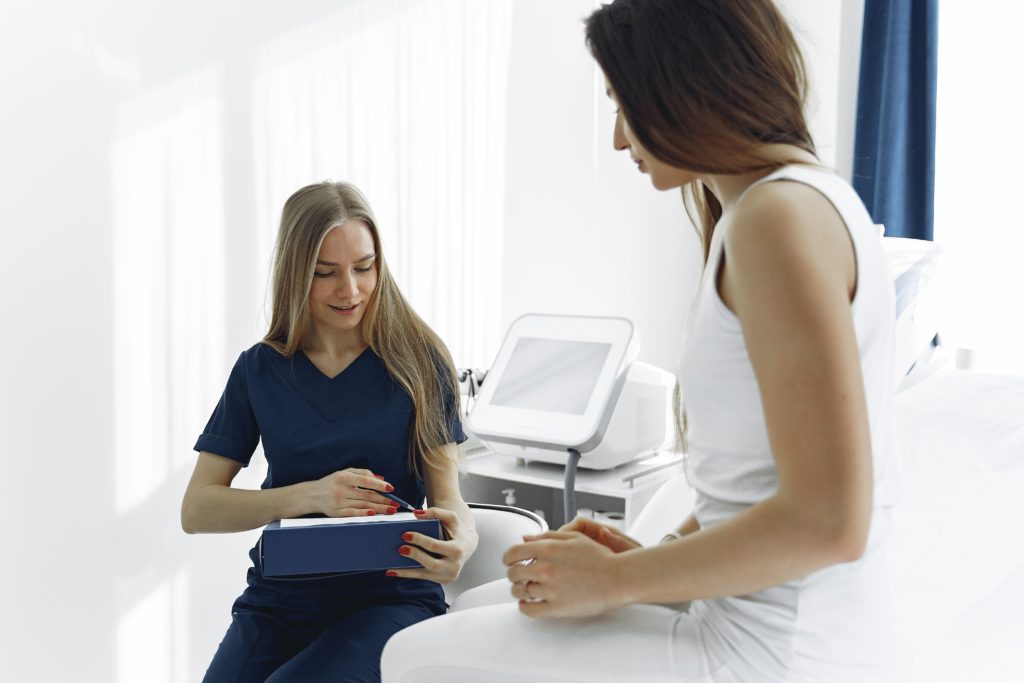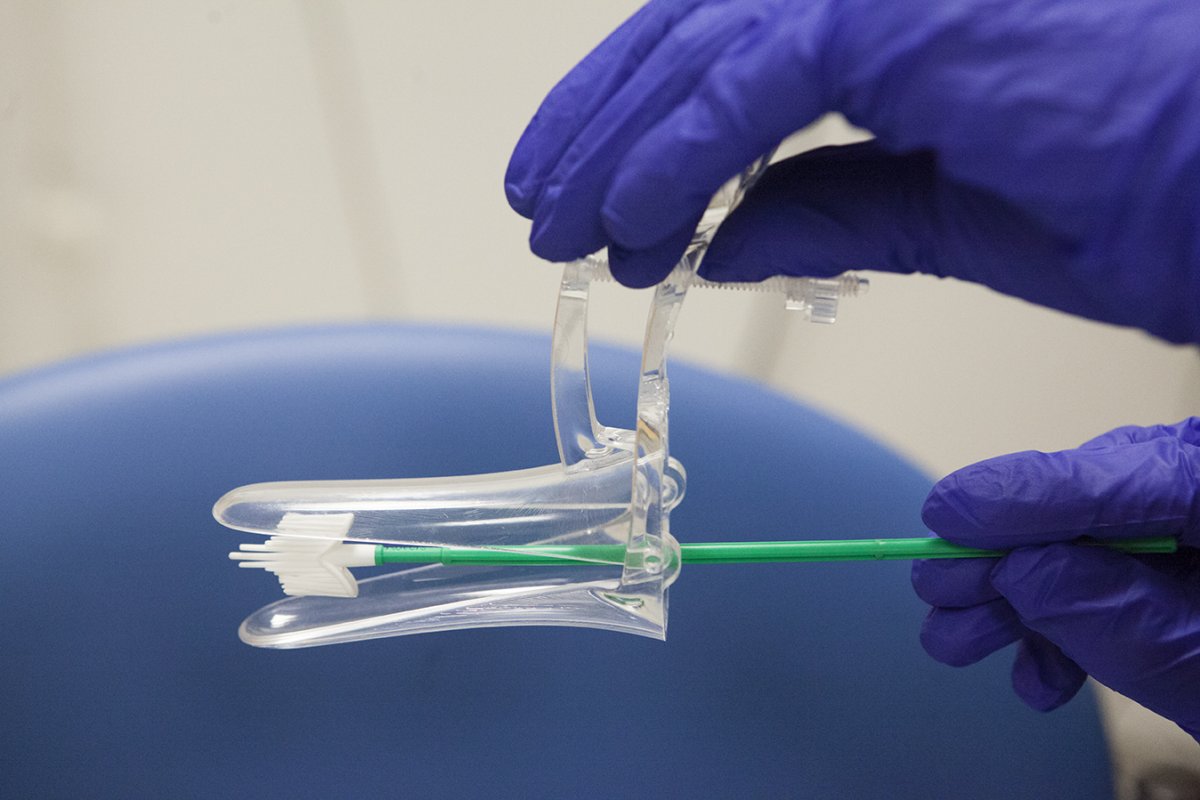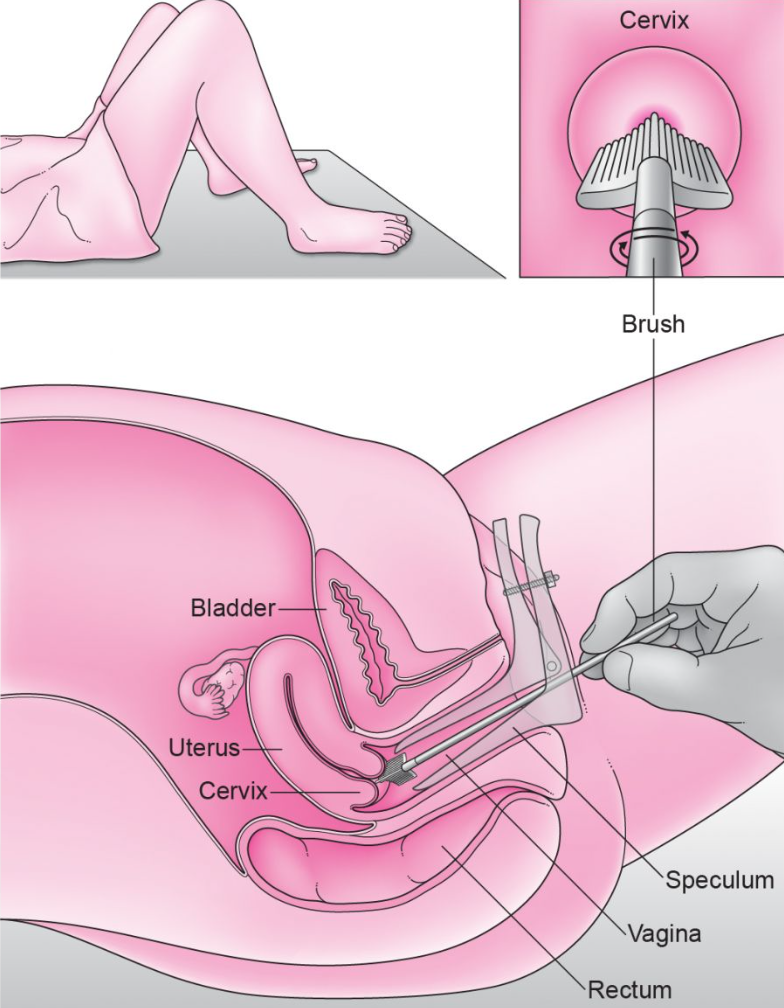The what, who, how, why and when of pap smears along with some of the most frequently asked questions about cervical screenings.
This article has been reviewed for medical accuracy by Valeriia Chelpan, M.D.
What is a pap smear? Is it the same as a pap test?
A ‘Pap smear’ (as it is commonly referred to in North America) or a ‘smear test’(most commonly used in the UK) is a type of medical screening used to check for pre-cancerous changes in the cervix (the neck of your womb), which if not treated may lead to cancer (World Health Organization, 2016). Cervical cancer screening is hugely important in the prevention of cervical cancer and saves 4,500 lives every year in England alone (BUPA, 2019). This test involves taking a sample of cells from the cervix that will be tested for potentially precancerous changes caused by certain high-risk types of human papillomavirus (HPV). HPV infection causes 99% of cervical cancers (Alexander, K. A., & Giuliano, A. R. 2012)
When should I start getting a Pap smear?
In short, if you’re eligible for a smear test/ Pap smear, you should have one!
If you’ve ever had any type of sexual contact (be it with men, women, people beyond the binary and sex toys) you should definitely attend a cervical screening appointment. Even if you haven’t been sexually active for a while, HPV infections are very common and can lie dormant, causing abnormal cells on the cervix later down the line. There is always the possibility that you may have been infected months or years before from a partner or using any sex toy. Most assigned-at-birth women get HPV at some point in their lives and don’t even know it!
In the UK, the NHS has a cervical screening programme available to all women aged 25 and 64. Those approaching their 25th birthday will usually receive a letter inviting them to make an appointment for their first smear test. Between the ages of 25 and 49, you will usually be invited to attend a cervical cancer screening every three years. From the age of 50, you are invited every five years.

Why are smear tests only for people over 25 in the UK?
There is much debate about whether it would be useful to screen for cervical cancer in people under 25. The current medical consensus is that cervical screening in those aged 20-24 doesn’t work as well as it does in those 25. It’s considered very common to have changes in cervix cells whilst you are young which tend to go away by themselves. Those over 65 are very unlikely to go on to develop cervical cancer providing that their last three test results were normal.
How do you book a Pap/smear test?
If you’re reading this, you’ve already started preparing for your first test by getting informed - go you!
If you’re in the UK, it is recommended that you book an appointment as soon as you receive your letter inviting you to the smear test - or as soon as you're eligible as per the testing criteria in your country. Hospitals and local doctors clinics often have these services at their locations. You can ask a trusted adult, your general healthcare provider, your school nurse, or call your local surgery to find out how to book your first smear. This service is normally covered by healthcare but this changes in every country. Once you’re done researching, setting up that date in the diary as soon as possible is the crucial first step to being prepared!

How do you prepare for a smear test?
Try to plan your smear test when you’re least likely to be on your period - whilst smear tests can be carried out whilst menstruating, it can lead to unclear results and need to redo the test.
Using any spermicide (including condoms coated with spermicide), lubricant or vaginal creams is not recommended for two days prior to your test as these contain chemicals that could affect the outcome of your test.
On the day of your appointment, a shower or bath may relax you and make you feel more self-confident. There is no need to wash more than usual or use anything other than water and unscented soap when it comes to cleansing your genital area, and most definitely do not douche. To learn more about how to clean your vagina properly, click here.
Jo’s Cervical Cancer Trust offer some helpful tips that may further help you to have a positive Pap smear experience which include:
- Talking to your doctor or nurse before the appointment
- Asking for the first appointment of the day
- Booking a longer or double appointment
- Asking for a nurse or doctor of a particular gender
- Taking someone you trust with you
- Visiting a specialist cervical screening clinic rather than a doctor’s surgery
(Jo's Cervical Cancer Trust, 2020)
What will actually happen at your cervical screening appointment?
On arriving at your appointment, a nurse or doctor will invite you into a treatment room. You will sit down and will explain to you what the test involves and ask if you have any questions. If they seem to be jumping into things, you can tell them it is your first screening as they may not have known. Always try your best to be vocal about what you need to understand. They may also ask you some questions about your medical history, for example, if you are on birth control, what medications you take, if you engage in sexual activity, the regularity of your menstruation etc. Use this opportunity to ask any questions you may have and to let them know if you are nervous. The nurse or doctor conducting your appointment will want to put you at ease and will do so with zero judgement and maximum respect to you as an individual. If you think it will help - you can ask to see the equipment they’ll be using and ask how they’ll be using it.

A speculum is a cylinder, usually metal or plastic, with a round end that is inserted into the vagina and opened to get a look at your cervix. There are different sizes available depending on whether you’ve had children The person carrying out your test should consult with you as to the best one to use and you can always request your preferred size. Ask questions as needed.
Following this consultation, you will be given privacy to undress from the waist down. This usually is behind a curtain or screen and the medical professional may even leave the room. If you’re wearing a dress or skirt, you can leave this on and just remove your underwear.
You’ll be asked to lie on an examination bed and given a paper sheet to cover the lower half of your body. The nurse or doctor will give you instructions on how to position yourself. The best positions are:
- On your back with your legs bent up, your ankles together and your knees apart, your feet may go in stirrups
- On your left side with your knees bent
You will be informed when the test is starting. Firstly, a new, clean speculum will be gently inserted into the vagina with a small amount of gel on it for ease of insertion. Once inside it is gently opened so that the medical professional can see your cervix. This does not typically hurt, but can be uncomfortable so taking calm breaths or talking to your doctor might help calm you down.

Next, a small soft brush is used to quickly take a sample of cells from your cervix. Whilst this may feel strange or foreign it should not be painful. This sample is then put into a small test tube of liquid to be sent to the lab for testing.
Once this has been completed, the speculum will be removed from the vagina and you’ll be given tissues to remove any excess gel. The practitioner will leave or you will go behind the curtain to have some privacy while getting dressed. The nurse or doctor will explain how and when you will receive the results of your screening. You may ask additional questions at this point but otherwise, you’re done!
After the Appointment

You did it! Most people are able to continue their days as usual following a cervical screening appointment although some may experience some light bleeding (spotting) for a day after the test (Jo's Cervical Cancer Trust, 2020). This is nothing to be worried about but take a menstrual pad you'd use on your lighter flow days or panty liner with you to your appointment and have them on standby for the day afterwards, just in case.
In the UK, your test results should arrive within 4 weeks by post, but your medical professional will inform you of when and how to expect them. In other places, you might be called to discuss your results, whether normal or abnormal, with your practitioner. You will be advised as well on when to book your next appointment.
FAQs
Are Pap smears painful?
Whilst a Pap smear may be uncomfortable for some people, it should never be painful. If you have a medical condition such as vaginismus or lichen sclerosus, talk to your doctor or nurse beforehand to alleviate any concerns (The Eve Appeal, 2020).
I want to get a test but I’m embarrassed, what do I do?
Your comfort and dignity is of paramount importance to the nurse or doctor conducting your test and there is nothing to be embarrassed about when it comes to looking after your health. They will never judge you or your body and are experienced and trained in cervical screening. If it helps, attend your appointment with a list of questions you’d like answered or take a chaperone.
How long will the test take?
The physical element of the screening should take no more than 5 minutes. With the preluding consultation you should be out of the office in around 10, excluding any general wait time before getting in!
Can I go back to school/work after my appointment?
Yes! Most people are able to go about their day-to-day business with no problems following their tests. If you have any concerns after your appointment, please follow up with your healthcare professional.
I’m pregnant, do I need a smear?
If you are currently pregnant and have previously had normal smear test results “you can probably postpone routine screening until three months after having your baby. But do check with your doctor or midwife.” (BUPA, 2019).
I don't identify as female, what provisions are there for me?
Trans men, or those identifying as non-binary, may experience dysphoria and discomfort around cervical screening and may wish to access a specialist cervical screening service.
Sexual violence
For those that have experienced sexual violence, there are specific clinics you can access to have your test done in a supportive and understanding environment.
Learning Disabilities
It's important that all who are eligible for cervical cancer screening can access an appointment. There are some excellent resources out there for explaining smear tests to those with learning disabilities, such as this one from Jo’s Cervical Cancer Trust.
References
Alexander, K. A., & Giuliano, A. R. (2012). HPV-beyond cervical cancer (online resource center). The American journal of medicine, 125(7), S1. https://doi.org/10.1016/j.amjmed.2012.03.005
BUPA. (2019, December). Smear test (cervical screening). BUPA. Retrieved December 01, 2020, from www.bupa.co.uk/health-information/womens-health/cervical-screening
The Eve Appeal. (2020, January 21). FAQ: Cervical Screening. The Eve Appeal. Retrieved December 01, 2020, from http://eveappeal.org.uk/gynaecological-cancers/cervical-cancer/ccpw2019/cervical-screening-faqs/
Jo's Cervical Cancer Trust. (2020, October 15). What happens at cervical screening. Jo's Cervical Cancer Trust. Retrieved December 01, 2020, from https://www.jostrust.org.uk/information/cervical-screening/what-happens-during-cervical-screening
Jo's Cervical Cancer Trust. (2020, October 29). Our cervical screening tips. Jo's Cervical Cancer Trust. Retrieved December 01, 2020, from https://www.jostrust.org.uk/information/cervical-screening/cervical-screening-tips
World Health Organization. (2016, January 21). Screening for Cervical Cancer. World Health Organization. Retrieved December 01, 2020, from www.who.int/cancer/detection/cervical_cancer_screening/en/
Popular reads on YPC
How to Talk About Your Period With Men
Talking about periods with male friends and co-workers doesn’t have to feel like unleashing landmines.
Read moreWhy and When Did Menstruation Become Taboo?
From the Yukon to Greece, taboos around menstruation have been around for ages and still…
Read moreSocial Media’s Important Role in Reducing Period Stigma
From the explosion of period art, to serving as an activist platform in the menstrual…
Read more